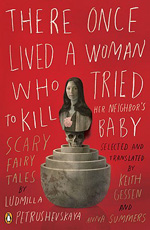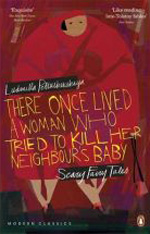


Penguin (US), paperback, 9780143114666
Penguin (UK), paperback, 9780718192075 (January)
Wow!
Ludmilla Petrushevskaya is big news in Russia, but was little known in the English-speaking world before the publication of this collection by Penguin in 2009. I hope much more of her work is published in English, because, on the evidence of this collection, she is a stunningly good writer.
One story in this collection, "The New Robinson Crusoes: A Chronicle Of The End Of The Twentieth Century," was published in Novy Mir alongside authorized extracts from Alexander Solzhenitsyn's Gulag Archipelago. The pity is that Petrushevskaya is so much less well known outside Russia than Solzhenitsyn. "The New Robinson Crusoes" follows the efforts of one family to escape an unspecified breakdown in society. Their aim is survival, and the teenage narrator regards each retreat further into the woods, each cunning stratagem to evade thieves and mobs, as a minor triumph: yet each throws the family more completely on their own resources. The story may be taking place "somewhere beyond the Mur River", but it could just as well be set somewhere just beyond the decaying margins of any foreclosure-belt city.
If forced to classify it, I'd say "The New Robinson Crusoes" is dystopian fiction, as is "Hygiene", about a family's increasingly desperate efforts to escape an unspecified plague and the lengths it pushes them to. But most of the stories here have a supernatural, or at least an uncanny, element, and many of them revolve around efforts to cheat, avoid, or return from death. Though the wider world is clearly in very bad shape due to war, disease, or social collapse, the focus of the stories is on families and individuals. Often Death has the last say; occasionally, as in "The Black Coat", the final story in the collection and one of my favourites, Death has to take a step backwards.
Russian writer. Gloomy title. Social collapse, plague, death always hovering. At this point, you might be thinking that it's all horribly depressing, and why should I bother?
Well, you should bother because these are very well-written stories. Ludmilla Petrushevskaya's prose style, as rendered by the translators, is light, direct, and sprightly—which makes for an especially effective contrast between style and material. You should bother because even in the more horrific tales, such as "Hygiene", not everything is lost. You should bother because there is a lot of humour here: "Marilena's Secret", the tale of two women's escape from the spell of a cruel magician, had me chuckling throughout and laughing out loud at the end. And if you've always been looking for a more contemporary Nikolai Gogol, or a less rococo Angela Carter, then you should definitely bother.
Is it perfect? No. I didn't think the first of the book's four sections, "Songs of the Eastern Slavs", was
as strong as the others; and in "The God Poseidon", the ending was obvious too early on. But these are quibbles.
There Once Lived A Woman Who Tried To Kill Her Neighbor's Baby is an outstandingly good short story
collection, and I urge you to read it.
